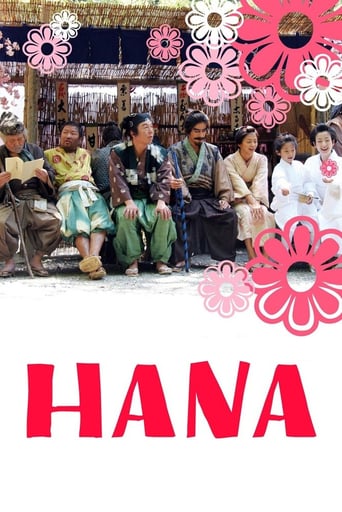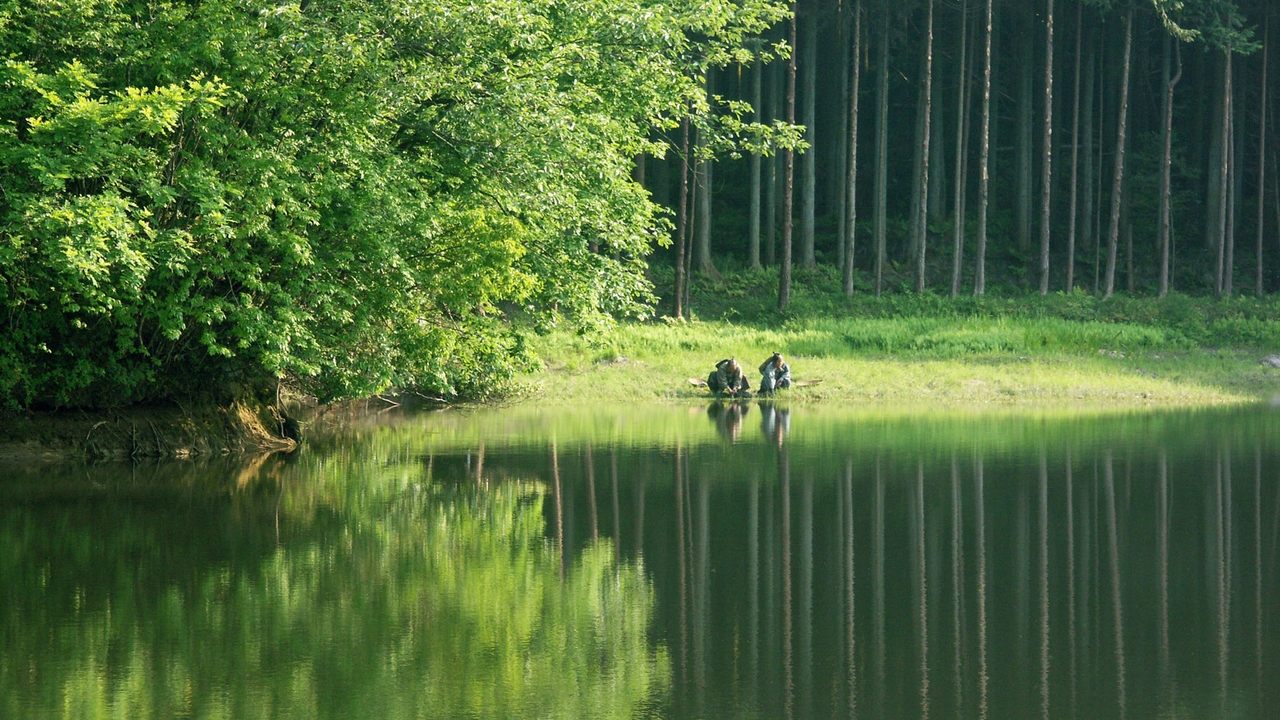politic1983
Limited, small community settings are more the focus for television soap operas than cinema, well, more commercial cinema at least. Lacking in action and excitement, two films that look more at the inner workings of the human condition rather than delivering out-and-out entertainment are Kore-eda Hirokazu's 2006 "Hana" and Yoshihiro Nakamura's 2013 "See You Tomorrow, Everyone"."Hana", Kore-eda's sole dip into the period drama, is set in a small community of early Eighteenth Century row houses. Souzaemon moves into the community as an obvious outsider: a middle-class samurai, he has no place being among society's low reaches. But his reason for being there is to seek out the man who murdered his father: the head of his clan. Souzaemon, however, is far from his father, clearly as out of place as a sword-carrying samurai as he is in the Edo milieu he finds himself in. Despite having located the murderer, he stays where he is, teaching the neighbourhood children and gradually integrating himself into part of the community, much to the chagrin of his clan back in Matsumoto who demand action for the regular funds supplied to him. Nakamura's "See You Tomorrow, Everyone", an equally slow-paced film, follows Satoru and his seemingly meaningless life living in a Tokyo project. Since leaving school, Satoru has spent his days doing his patrols, essentially keeping tabs on all the other inhabitants of the artificial community. One-by-one, those close to him move away to start new lives, leaving him alone, unemployed and with little prospect of a life beyond idolising his karate heroes.Feigning purpose with his daily rounds of his neighbours, his meddling soon upsets those around him and he is forced into making choices: he starts a job at a cake shop within the complex; gets engaged; and befriends a young Brazilian girl with a troubled home life, though again his interfering is unwelcome. Both are films set in low-income housing, though at different periods in time. "Hana" is set in a peasant dwelling, where people just about scrape enough money together to not pay the rent. These are people seeing little hope of a better life, and so accept the lot of where they are. "See You Tomorrow, Everyone", however, is a modern day equivalent: once seen as the artificial community of the future, it is now becoming a baron wasteland populated by single mums, the elderly and immigrant workers. People only see their future in escaping from it, something which Satoru cannot face-up to. The two leads are reluctant heroes: their situations both caused by a single violent act. Souzaemon is expected to follow the samurai tradition and seek revenge for the murder of his father, but never a swordsman of any skill, he stands little chance of carrying out his proposed destiny, as well as lacking any will to cause harm to his fellow man. A social problem in Japan, Satoru imprisoned himself at home in the projects after a school knife attack left him fearful of the outside world. Life has become theory that fails to ever get put into practice until a meeting with a young Brazilian girl who is outcast by her mother's Japanese boyfriend sees him look after their home and stand-up to the bad guy.Both have a villain to face, but where Satoru finally learns to stand-up to his enemy, Souzaemon makes the decision to befriend his father's killer and build a new path for his life. Both have found themselves in situations in which they were comfortable in life, too comfortable. Souzaemon found it easier to teach local children, living off the funds sent to him - funds for him to enact revenge. He hides from his social status as samurai and suffers from the inner conflict of his desire to be kind-hearted against his clan's expectation that he will fulfil his duty. Satoru's fears of the outside world keep him trapped in a prison of his own making. Ever since that day at school, he has been unable to step outside his self-imposed boundaries, oblivious to what is actually happening around him, despite believing himself to be the guardian of the complex. The world will move on until he is left behind and alone.Souzaemon's actions are considered and he is becoming a man - though different from what is expected - who chooses to lead his own life. Satoru, however, is unconscious in his life. His fears have seen him create his own world and his place within it, and while he insists on staying inside it, everyone else has chosen to leave. The act that sees him eventually break free from this world is an unconscious reaction without a moment's thought. Despite being a different setting for Kore-eda, "Hana" fits his usual slow-paced style, though perhaps with a bit more tomfoolery than usual. "See You Tomorrow, Everyone" is very slow in pace and development, though the timing of revelations are well worked and is a strong point of Nakamura's developing of the story. But being a period piece, there is a little less social comment at work than one would expect from Kore-eda. "Hana" looks at close community and as the film develops, Souzamon's friends increase in number. This is the opposite for Satoru, however, who can count the numbers reducing by the day. Nakamura comments on the gradual loss of community: the sad result on what was once considered to be the bright, hopeful environment of the future. People only want to move away and escape with little or no real knowledge of those who live around them. Those still there are the ones ignored by society and hidden away. Perhaps reflecting the difference of the period settings, "Hana" sees Souzaemon find a home, as well as himself; while "See You Tomorrow, Everyone" finds Satoru needing to escape the prison modern society has created. politic1983.blogspot.co.uk
Harry T. Yung
Director of "Dare mo shiranai" (2004) (which brought 14-year-old Yagira Yuya his Cannes Best Actor award) tackles his first samurai movie "Hana yori mo naho" the literal translation of which is something like "martial artist of flower". Following this title, the Hippie's "flower power" in the 60's is not such a far-fetched thought association. This "samurai movie" refuses to give traditional samurai movie fans even one single sword combat scene. Like "7 samurai", "Twilight samurai" and "Hidden sword and devil's claw" and "Shinobi", Hana depicts the dying world of samurai. Unlike any of these, however, it takes the lighter side, to the point of farce and parodies. The simply main plot depicts how a young samurai called Suza (Odaka Junichi), financed by family fortune, come to a poverty-stricken village in search of an "adversary" (that's what the local sub-title says) to revenge his father's death. While it does not go to anti-hero proportions, it soon becomes evident that Suza's interest is not in traditional samurai values of bushido and revenge, but in trying to help the local kids (and adults) to become literate. Like "7 samurai", "Twilight samurai" and "Hidden sword and devil's claw" and "Shinobi", Hana depicts the dying world of samurai. Unlike any of these, however, it takes the lighter side.This samurai-turned-teacher also develops an honourable attachment to a beautiful widow (Miyazawa Rie) and her bright 8-year-old son, becoming something akin to the surrogate head of the family. When the "adversary" (Asano Tadanobu) appears on the scene, with his own family that include a 7-year-old son, the score is not settled by the expected duel-to-death, but unexpectedly through the friendship of the two little boys.But this is not all, far from it. True to the Kurosawa tradition, to which great tributes have obviously been paid, this movie portrays an ensemble of common, simple, "little" people, at least a dozen of them, probably more. Simply but honestly told, some of these stories are familiar such as a parted young couple ended up with the girl marrying a rich man, or two lonely old folks finding love and comfort with each other. More adventurous is a rather daring spoof of the much revered legend of the "47 ronins". You'll find even a trace of Shakespeare (Midsummer night's dream) in the rehearsal of a play in the movie. However, without the usual commercial elements, this movie may bore uninformed audience seeking a thrill, despite the fact that it is crisply shot, contains some funny moments and sustains by lively music that sounds almost Scottish. Okada Junichi, not generally known even to regular followers of the Japanese movie scene, does justice to the character of the gentle, troubled young samurai. Miyazawa Rie, in her beguiling beauty that is all at once both fragile and strong, creates a different but equally memorable character as the abandoned wife in "Twilight samurai". Asano Tadanobu's fans may be disappointed because what he has in fact amount to almost cameo role (although not an unimportant one). In conclusion I can do no better that quoting the introductory literature in the Toronto International File Festival: "Vivacious and strewn with humour, HANA speaks the language of today and conveys a message of hope and serenity that crosses the boundaries of its temporal setting. Without imposing heavy moral judgments, it asserts a clear ethic and renders a colourful portrait of human weaknesses and strengths - its rich narrative texture is variegated as the precious fabric of a regal kimono."
dumsumdumfai
A good film, not a masterpiece like Maboroshi, not nearly as enigmatic as Distance, not as charming as Aftelife .. but far more audience friendly.There are many characters, and it is a period piece, and is described as "A samurai movie without sword fight" by the director himself at TIFF.In fact, compared to his other movies, there are so many things going on I was ill-prepared. But the script is well thought out, there is reference to the solution early on in the film. But there is a sub-plot which I do not understand except maybe to convey regret -- that is what the hero of the film is so serious of finding how not to have in his future, when looking back at this time in his life ..later on???? There is so much comedic relief that you could say this is a comedy. But I think it is drama through and through. And a well executed one at that.
kovalsky-1
It's one of those films you come out of smiling a wide happy smile - it's so delicate and subtly funny (alright, it does feature a lavatory, but none of the "standard" toilet humor), it's also kind to characters and makes its point(s) in a sly, unobtrusive manner.It's a celebration of human values over the way of the samurai, especially as it has been presented in Japanese and Western popular culture in the past few decades. A joy to watch visually, too. I thought it might be Koreeda-san's best film so far, although some viewers may find it a bit more conventional/Westernized than, say, Nobody Knows or Maboroshi (which is not at all bad).I will deliberately leave it at that, to avoid revealing any of the plot, which often overturns expectations.It was the second film out of 17 I saw at the Toronto International Film Festival, and it still remains a highlight for me.


 AD
AD



